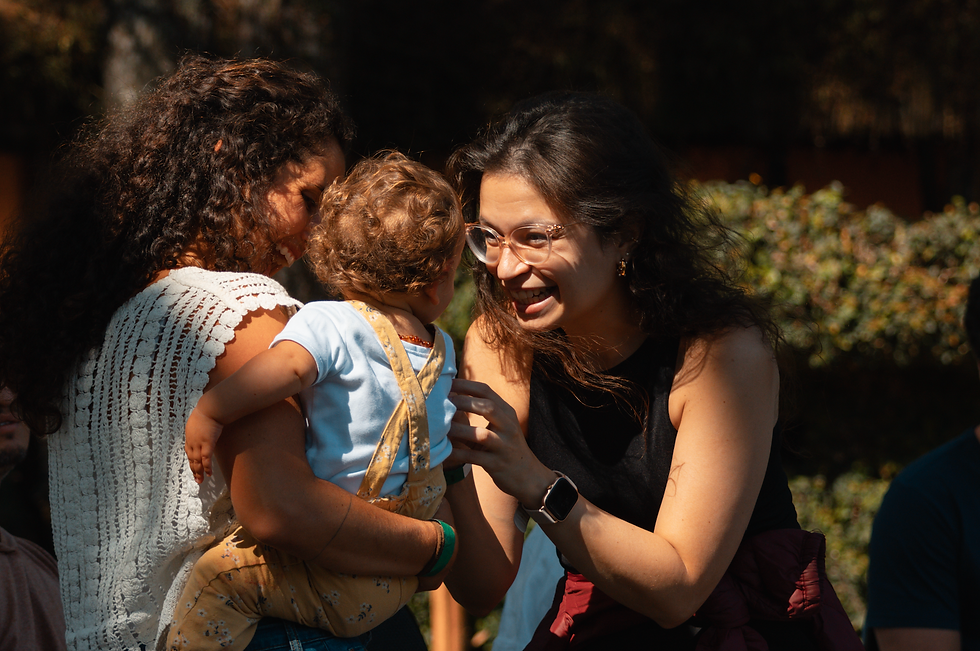From Ego to Eco: Why We Need Ecocentric Economies — and Spaces Like the BE Hive, by Pooven Moodley
- mia8893
- Jun 12, 2025
- 4 min read

Pooven Moodley is a human rights and environmental lawyer working with indigenous and local communities globally. His lifelong activist journey began at just 14 during South Africa's anti-apartheid movement.
He has since stood at the frontlines of global justice — from leading campaigns at Oxfam and ActionAid to co-piloting the successful resistance against South Africa’s nuclear deal with Russia, defying immense political pressure.
Former Executive Director of Natural Justice, Pooven weaves law, activism, and deep care for the Earth into bold action.
This article was written by Pooven after his recent visit to BE Hive Cape Winelands — our new and emerging hub for eco-centric economies.

There is finally a realisation that the current economic paradigm is both extractive and destructive — fuelling inequalities, injustices and accelerating the sixth mass extinction. In response, people across the world are urgently seeking radical alternatives to create a different pathway where all life can thrive.
In the legal arena, we have collectively been pushing the boundaries of the law. Initially it was to ensure basic human rights. The next phase was ensuring the protection of our ecosystems. In this regard, lawyers around the world pushed the boundaries to ensure the rights of nature is respected. The next phase was to push the boundaries even further by recognition of what is invisible like the spirit of the Jungle in the Amazon or of Mountains like Table Mountain in Cape Town.
The idea is to shift consciousness and the way we experience other parts of nature. So, what does this have to do with ecocentric economies?
At this critical juncture in human history, as ecological breakdown converges with social fragmentation and spiritual alienation, the call to reimagine how we live, work, and relate has never been more urgent.
Across the globe, movements are stirring that offer a different path: one that places life at the centre. These are the seeds of ecocentric economies — economies rooted in the values of interdependence, reciprocity, care, and regeneration.

Ecocentric economies are not simply about “greening" our current systems. They represent a fundamental shift in worldview — from seeing ourselves as separate from nature, to recognising that we are nature.
In an ecocentric economy, the wellbeing of the Earth and all its beings is not a footnote to profit but the very purpose of economic activity. This shift is as spiritual as it is structural: it requires us to redesign not only our policies and institutions, but also our imaginations.
The BE Hive, recently launched by Be the Earth Foundation in the Cape Winelands, is a place where this reimagining becomes possible — not in theory, but in practice.
Nestled within the regenerative landscape of Boschendal, surrounded by forest, mountains, and open sky, the BE Hive is more than a co-working space. It is a sanctuary for eco-centric cultures to root, grow, and thrive. A hive of cross-pollination, it invites artists, farmers, entrepreneurs, healers, and changemakers to gather not to hustle harder, but to slow down, deepen, and reconnect with the rhythms of life.
In contrast to the ego-centric culture of modern work — driven by urgency, competition, and burnout — the BE Hive offers a new model: work as ritual, collaboration as kinship, rest as resistance.
Conversations around the fire spark projects that are not just economically viable but ecologically and spiritually aligned.

I spent time at the BE Hive during the past few months. It has added deeply to the transformational journey I am on. I felt deeply connected to the Mountains there and to the land. I even wrote overnight, as I got deeply inspired, the final chapter in the book I am completing. The food forest is an inspiration for how we should be seeding, growing and eating. One of the most important experiences was meeting incredible people from across the world who spend time here and this has opened new possibilities in our collective journey. It is a beautiful space for healing.
This is the ecology of transformation. Because systemic change does not emerge from the same conditions that created the crisis. It requires new patterns, new environments, and new relationships. Spaces like the BE Hive act as incubators for these patterns.
They support the inner and outer work needed to birth ecocentric alternatives — from community currencies and regenerative agriculture to decolonial land stewardship and ancestral knowledge systems.
The BE Hive is also part of a growing network of regenerative hubs around the world — bioregional sanctuaries where the future is being composted and cultivated. These hubs are not utopias; they are living laboratories of transition. They hold the tensions of our time while weaving new stories of interbeing. And they remind us that transformation is not only about what we build, but how we build it: in right relationship, with humility, care, and reverence.
Ecocentric economies ask us to widen our circles of concern — to include rivers and pollinators, future generations and forgotten ancestors, fungi and forests. They demand that we measure value in ways that honour life — not just GDP, but soil health, cultural resilience, collective joy. And they invite us to co-create economies that heal rather than harm, that regenerate rather than extract, that are rooted in the cycles and wisdom of the living Earth.
This is not a niche or a trend. It is the necessary evolution of our species. And it cannot happen in isolation.
We need spaces like the BE Hive — places of beauty and belonging, where we can remember who we are and why we’re here. Places that nourish both the visionary and the practical, the mystical and the strategic. Places where we can dream and do, rest and rise, listen and lead.



